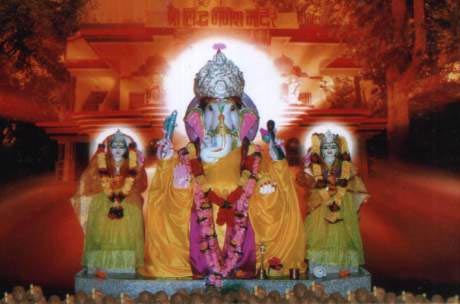
Shree Sidh Ganesh
|
Bhagwan Ved Vyas asked Brahmaji could you please explain what’s the benefit of Shree Sidh Ganesh Vrat and tell me who on Earth benefited from doing this vrat.
Then Brahmaji told this story. Oh my dear vyasji. Many people of Earth performed this vrat and by doing so they were blessed, from them I tell you a story of Surbahu Shatriya, now listern carefully.
There was a country city called Pipalpur in Goddesh country in the Southern hemisphere. There lived a honest but poor man called Surbahu. He worked very hard to feed this family but there was never enough for entire family. Seeing all this his wide Subhadra always complained and consistently nagged him about the poor situation they were in.
One day he had enough of this constant nagging and humiliation from his wife, Surbahu decided to run away from home, while the family was sleeping.
He ended up in the forest, thirsty, hungry and lost, started wondering around. In the end he ended up near a lake, walking to the lake he drank water and sat underneath a wonderful rubber (valdo) tree. While leaning against the tree he stated thinking about his many subjects in his head. While doing so he fell asleep. Many hours pasted while asleep, he had a dream that something was about to eat him, he thought it might be an animal but was too afraid to open his eyes and look. He assumed he was going to die so he prepared him self to face the death, thinking it’s better to die than to live such sad life. But suddenly something happened Surbahu slowly opened his eyes and saw a human figure in the night shadow. Seeing this he got up and shouted, why do you want to wake a poor guy like me in the middle of the night. Who are you and what do you want from me? Who ever you are just eat me and put me out of my misery from this life.
Hey dear, you seem depressed by this human life, but afraid not, my name is Kaushik Rishi (sage), I’ve been doing meditation in this forest for many years. Dear get up and come with me.
By saying comforting words Kaushik Rishi, helped Surbahu onto his feet and took him to his ashram and gave him food and drink and listened to his story. Kaushik Rishi was sadden by Surbahu’s poor condition.Kaushik Rishi blessed Surbahu and told him Shree Sidh Ganesh Vrat Katha and instructions about performing ritual everyday.
Surbahu stayed in Kaushik Rishi’s ashram and performed vrat as instructed.
During this period, Bhagvan Shree Sidh Ganesh blessed him. Back in his home kindom, Pipalpur, the king accepted Surbahu’s wife as his religious sister and provided them with necessary for confortable life. The king also send out his people in search of Surbahu.
After three months, Surbahu returned to Pipalpur on Bhadarva Sud Satudasiye after completing Bhagvan Shree Sidh Ganesh’s vrat. Seeing him, his wife and children were over joyed with happiness.
Subhadra told his husband, Surbahu the full story about king accepting her his religious sister and providing all care. Hearing all this Surbahu said “All this is due to blessing of Shree Sidh Ganesh”. Subhadra you should start performing this ritual everyday also. She performed vrat accordingly and with complete honestly and faith.
The king made Surbahu his comandar. Accepting all this as a blessing of Shree Sidh Ganeshji, he started living life with happiness.
His Surbahu became a king named Naal, in his next life.
Jai Shree Sidh Ganesh Namah
Vrat
Vrat denotes a religious practice to carry out certain obligations with a view to achieve divine blessing for fulfillment of one or more than one desire. Etymologically, vrat, a Sanskrit word (and also used in several Indo-European languages), means to vow or to promise.
A vrat may consist of one or more of several actions. Such actions may include complete or partial fasting on certain specific days; a pilgrimage (thirtha) to a particular place or more than one place; a visit and darshan and puja at a particular temple or more than one temple; recitation of mantras and prayers; performing puja and havans.
According to Hindu scriptures, vrat assists the person doing the vrat to achieve and fulfill his desires as performing vratas are supposed to bring the divine grace and blessing. Sometimes, close relatives or family purohits may be entrusted with the obligation of performing the vrat on behalf of another person. The object of performing vrat is as varied as the human desire, and may include gaining back lost health and wealth, begetting offspring, divine help and assistance during difficult period in one’s life. In Ancient India, vrat played a significant role in the life of individuals, and it continues to be practiced in modern times as well by a number of Hindus.
